Reflecting on the Stolen Generation: Course 401206 Module 2
VerifiedAdded on 2022/09/18
|6
|1206
|47
Report
AI Summary
This assignment is a reflective report exploring the student's learning experience concerning the Stolen Generation and its impact on Aboriginal and Torres Strait Islander peoples' health, specifically addressing module 2 of course 401206. The student utilizes the Gibbs Reflective Cycle to analyze their initial feelings, critical evaluations, and biases before and after learning about the topic. The reflection delves into historical, political, and cultural factors influencing attitudes and beliefs, particularly focusing on assimilation policies and their consequences. The report concludes with a discussion of the student's changed understanding, conclusions, and action plan for future nursing practice, emphasizing the importance of culturally safe care and addressing personal biases. The report includes references to peer-reviewed journal articles. The assignment aims to develop critical reflective thinking and cultural safety in relation to the delivery of healthcare.
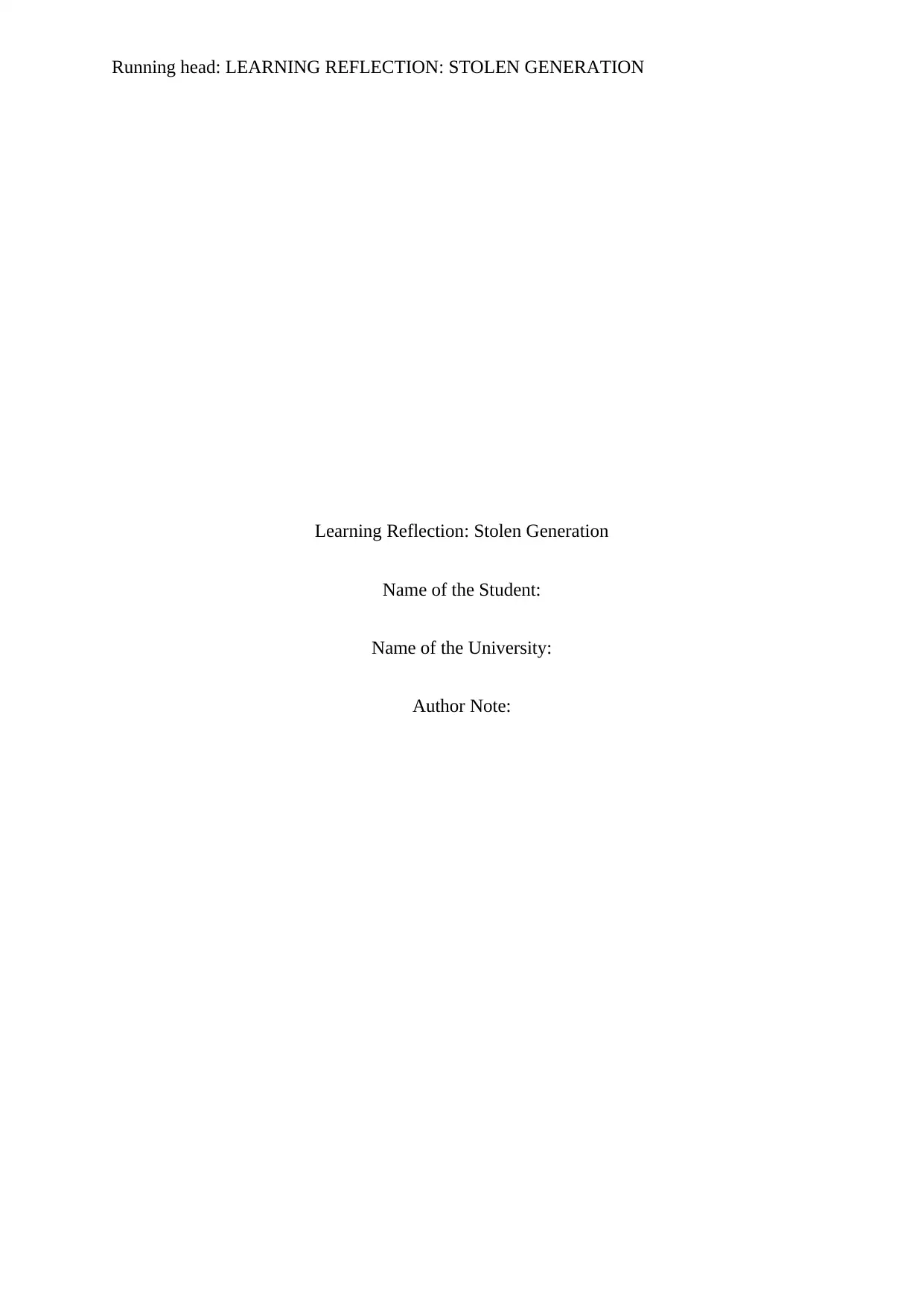
Running head: LEARNING REFLECTION: STOLEN GENERATION
Learning Reflection: Stolen Generation
Name of the Student:
Name of the University:
Author Note:
Learning Reflection: Stolen Generation
Name of the Student:
Name of the University:
Author Note:
Paraphrase This Document
Need a fresh take? Get an instant paraphrase of this document with our AI Paraphraser
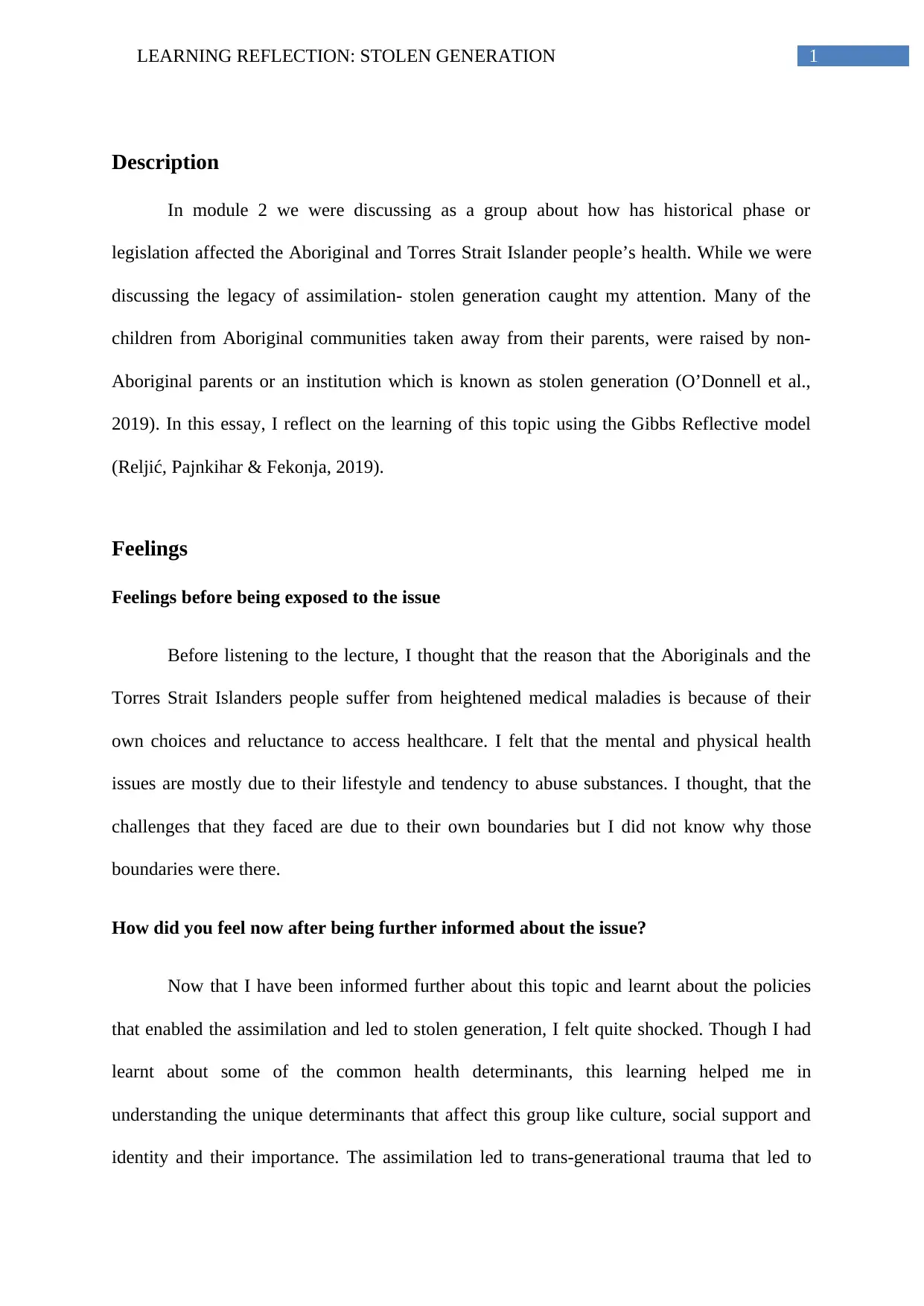
1LEARNING REFLECTION: STOLEN GENERATION
Description
In module 2 we were discussing as a group about how has historical phase or
legislation affected the Aboriginal and Torres Strait Islander people’s health. While we were
discussing the legacy of assimilation- stolen generation caught my attention. Many of the
children from Aboriginal communities taken away from their parents, were raised by non-
Aboriginal parents or an institution which is known as stolen generation (O’Donnell et al.,
2019). In this essay, I reflect on the learning of this topic using the Gibbs Reflective model
(Reljić, Pajnkihar & Fekonja, 2019).
Feelings
Feelings before being exposed to the issue
Before listening to the lecture, I thought that the reason that the Aboriginals and the
Torres Strait Islanders people suffer from heightened medical maladies is because of their
own choices and reluctance to access healthcare. I felt that the mental and physical health
issues are mostly due to their lifestyle and tendency to abuse substances. I thought, that the
challenges that they faced are due to their own boundaries but I did not know why those
boundaries were there.
How did you feel now after being further informed about the issue?
Now that I have been informed further about this topic and learnt about the policies
that enabled the assimilation and led to stolen generation, I felt quite shocked. Though I had
learnt about some of the common health determinants, this learning helped me in
understanding the unique determinants that affect this group like culture, social support and
identity and their importance. The assimilation led to trans-generational trauma that led to
Description
In module 2 we were discussing as a group about how has historical phase or
legislation affected the Aboriginal and Torres Strait Islander people’s health. While we were
discussing the legacy of assimilation- stolen generation caught my attention. Many of the
children from Aboriginal communities taken away from their parents, were raised by non-
Aboriginal parents or an institution which is known as stolen generation (O’Donnell et al.,
2019). In this essay, I reflect on the learning of this topic using the Gibbs Reflective model
(Reljić, Pajnkihar & Fekonja, 2019).
Feelings
Feelings before being exposed to the issue
Before listening to the lecture, I thought that the reason that the Aboriginals and the
Torres Strait Islanders people suffer from heightened medical maladies is because of their
own choices and reluctance to access healthcare. I felt that the mental and physical health
issues are mostly due to their lifestyle and tendency to abuse substances. I thought, that the
challenges that they faced are due to their own boundaries but I did not know why those
boundaries were there.
How did you feel now after being further informed about the issue?
Now that I have been informed further about this topic and learnt about the policies
that enabled the assimilation and led to stolen generation, I felt quite shocked. Though I had
learnt about some of the common health determinants, this learning helped me in
understanding the unique determinants that affect this group like culture, social support and
identity and their importance. The assimilation led to trans-generational trauma that led to
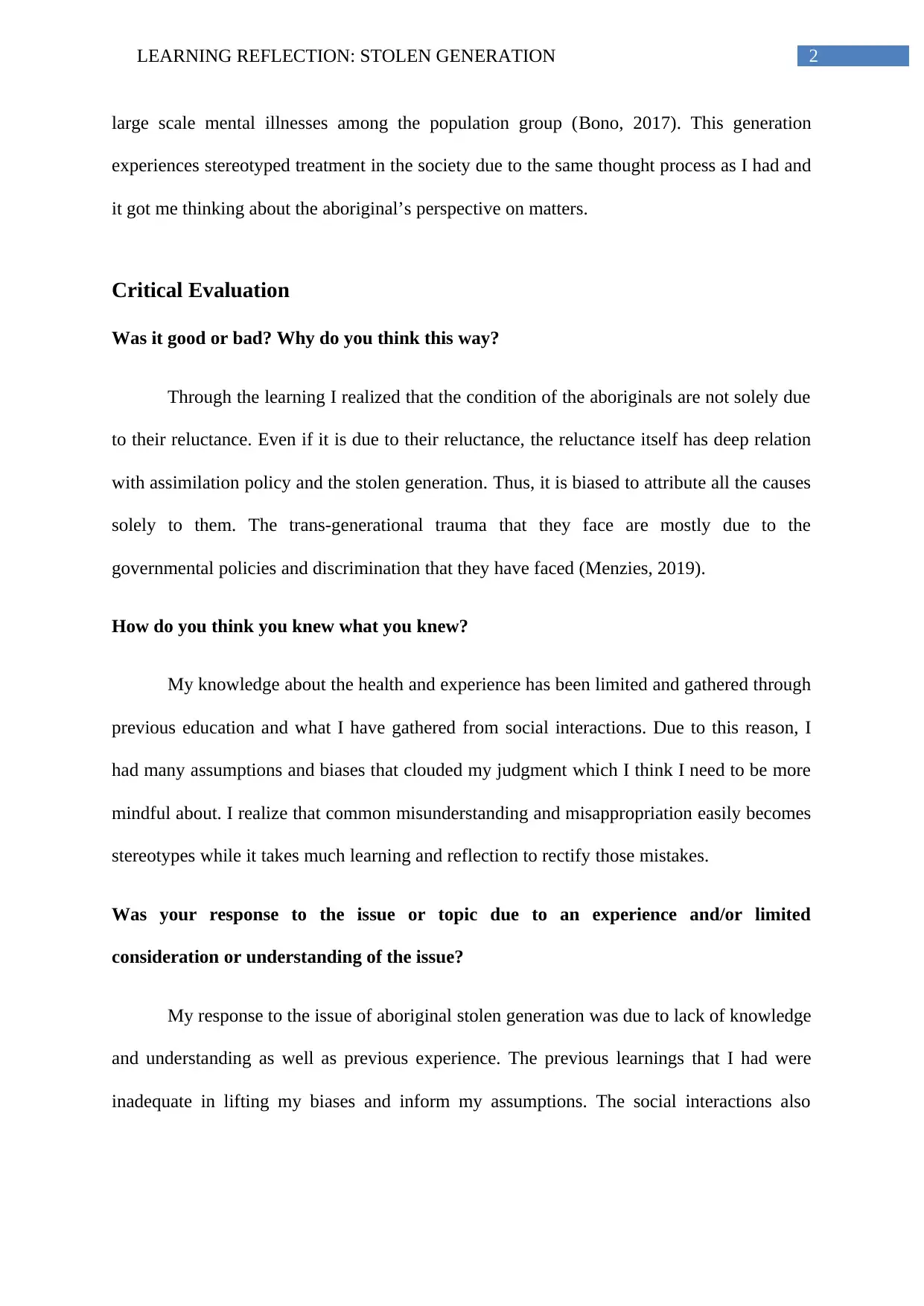
2LEARNING REFLECTION: STOLEN GENERATION
large scale mental illnesses among the population group (Bono, 2017). This generation
experiences stereotyped treatment in the society due to the same thought process as I had and
it got me thinking about the aboriginal’s perspective on matters.
Critical Evaluation
Was it good or bad? Why do you think this way?
Through the learning I realized that the condition of the aboriginals are not solely due
to their reluctance. Even if it is due to their reluctance, the reluctance itself has deep relation
with assimilation policy and the stolen generation. Thus, it is biased to attribute all the causes
solely to them. The trans-generational trauma that they face are mostly due to the
governmental policies and discrimination that they have faced (Menzies, 2019).
How do you think you knew what you knew?
My knowledge about the health and experience has been limited and gathered through
previous education and what I have gathered from social interactions. Due to this reason, I
had many assumptions and biases that clouded my judgment which I think I need to be more
mindful about. I realize that common misunderstanding and misappropriation easily becomes
stereotypes while it takes much learning and reflection to rectify those mistakes.
Was your response to the issue or topic due to an experience and/or limited
consideration or understanding of the issue?
My response to the issue of aboriginal stolen generation was due to lack of knowledge
and understanding as well as previous experience. The previous learnings that I had were
inadequate in lifting my biases and inform my assumptions. The social interactions also
large scale mental illnesses among the population group (Bono, 2017). This generation
experiences stereotyped treatment in the society due to the same thought process as I had and
it got me thinking about the aboriginal’s perspective on matters.
Critical Evaluation
Was it good or bad? Why do you think this way?
Through the learning I realized that the condition of the aboriginals are not solely due
to their reluctance. Even if it is due to their reluctance, the reluctance itself has deep relation
with assimilation policy and the stolen generation. Thus, it is biased to attribute all the causes
solely to them. The trans-generational trauma that they face are mostly due to the
governmental policies and discrimination that they have faced (Menzies, 2019).
How do you think you knew what you knew?
My knowledge about the health and experience has been limited and gathered through
previous education and what I have gathered from social interactions. Due to this reason, I
had many assumptions and biases that clouded my judgment which I think I need to be more
mindful about. I realize that common misunderstanding and misappropriation easily becomes
stereotypes while it takes much learning and reflection to rectify those mistakes.
Was your response to the issue or topic due to an experience and/or limited
consideration or understanding of the issue?
My response to the issue of aboriginal stolen generation was due to lack of knowledge
and understanding as well as previous experience. The previous learnings that I had were
inadequate in lifting my biases and inform my assumptions. The social interactions also
⊘ This is a preview!⊘
Do you want full access?
Subscribe today to unlock all pages.

Trusted by 1+ million students worldwide
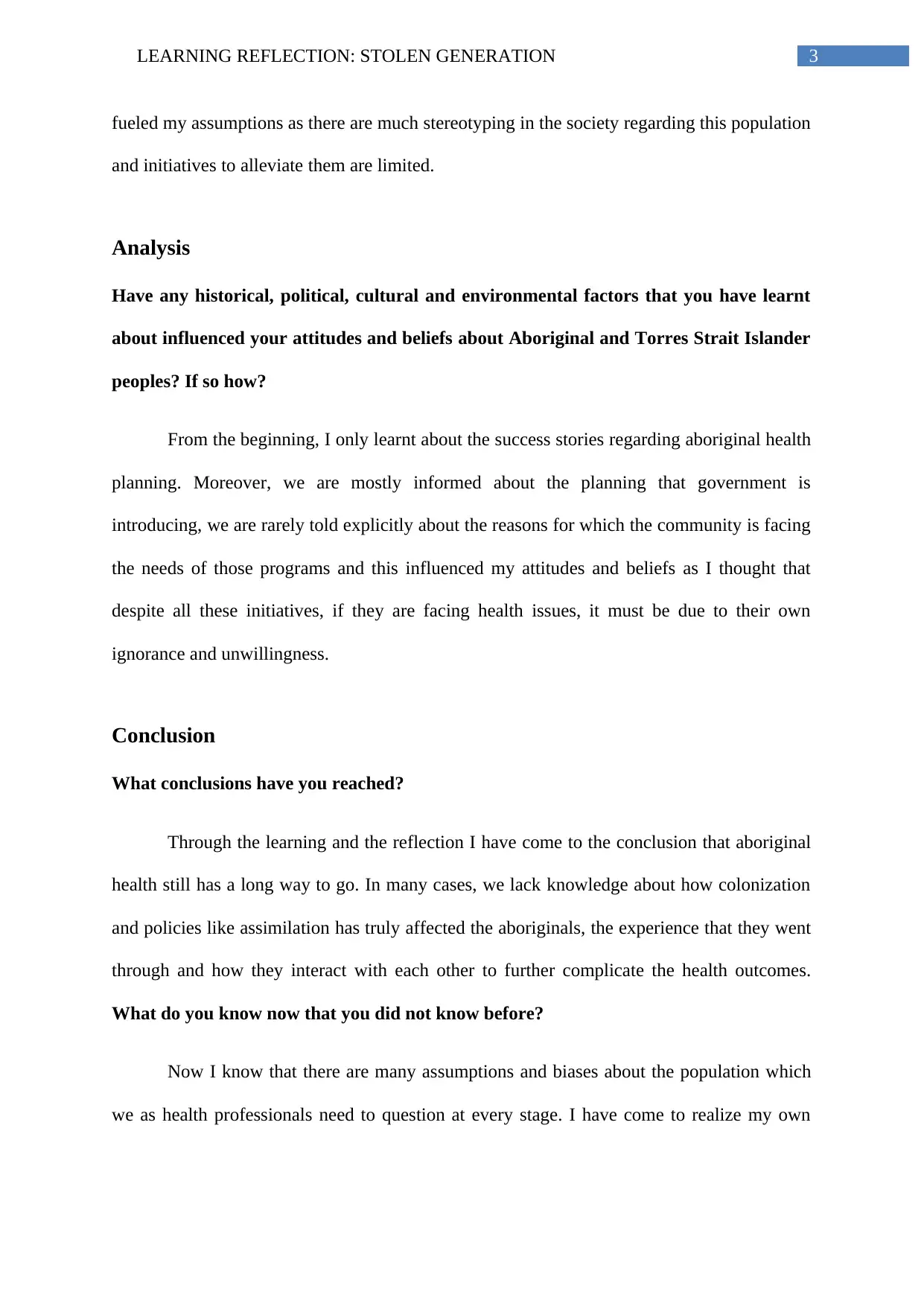
3LEARNING REFLECTION: STOLEN GENERATION
fueled my assumptions as there are much stereotyping in the society regarding this population
and initiatives to alleviate them are limited.
Analysis
Have any historical, political, cultural and environmental factors that you have learnt
about influenced your attitudes and beliefs about Aboriginal and Torres Strait Islander
peoples? If so how?
From the beginning, I only learnt about the success stories regarding aboriginal health
planning. Moreover, we are mostly informed about the planning that government is
introducing, we are rarely told explicitly about the reasons for which the community is facing
the needs of those programs and this influenced my attitudes and beliefs as I thought that
despite all these initiatives, if they are facing health issues, it must be due to their own
ignorance and unwillingness.
Conclusion
What conclusions have you reached?
Through the learning and the reflection I have come to the conclusion that aboriginal
health still has a long way to go. In many cases, we lack knowledge about how colonization
and policies like assimilation has truly affected the aboriginals, the experience that they went
through and how they interact with each other to further complicate the health outcomes.
What do you know now that you did not know before?
Now I know that there are many assumptions and biases about the population which
we as health professionals need to question at every stage. I have come to realize my own
fueled my assumptions as there are much stereotyping in the society regarding this population
and initiatives to alleviate them are limited.
Analysis
Have any historical, political, cultural and environmental factors that you have learnt
about influenced your attitudes and beliefs about Aboriginal and Torres Strait Islander
peoples? If so how?
From the beginning, I only learnt about the success stories regarding aboriginal health
planning. Moreover, we are mostly informed about the planning that government is
introducing, we are rarely told explicitly about the reasons for which the community is facing
the needs of those programs and this influenced my attitudes and beliefs as I thought that
despite all these initiatives, if they are facing health issues, it must be due to their own
ignorance and unwillingness.
Conclusion
What conclusions have you reached?
Through the learning and the reflection I have come to the conclusion that aboriginal
health still has a long way to go. In many cases, we lack knowledge about how colonization
and policies like assimilation has truly affected the aboriginals, the experience that they went
through and how they interact with each other to further complicate the health outcomes.
What do you know now that you did not know before?
Now I know that there are many assumptions and biases about the population which
we as health professionals need to question at every stage. I have come to realize my own
Paraphrase This Document
Need a fresh take? Get an instant paraphrase of this document with our AI Paraphraser
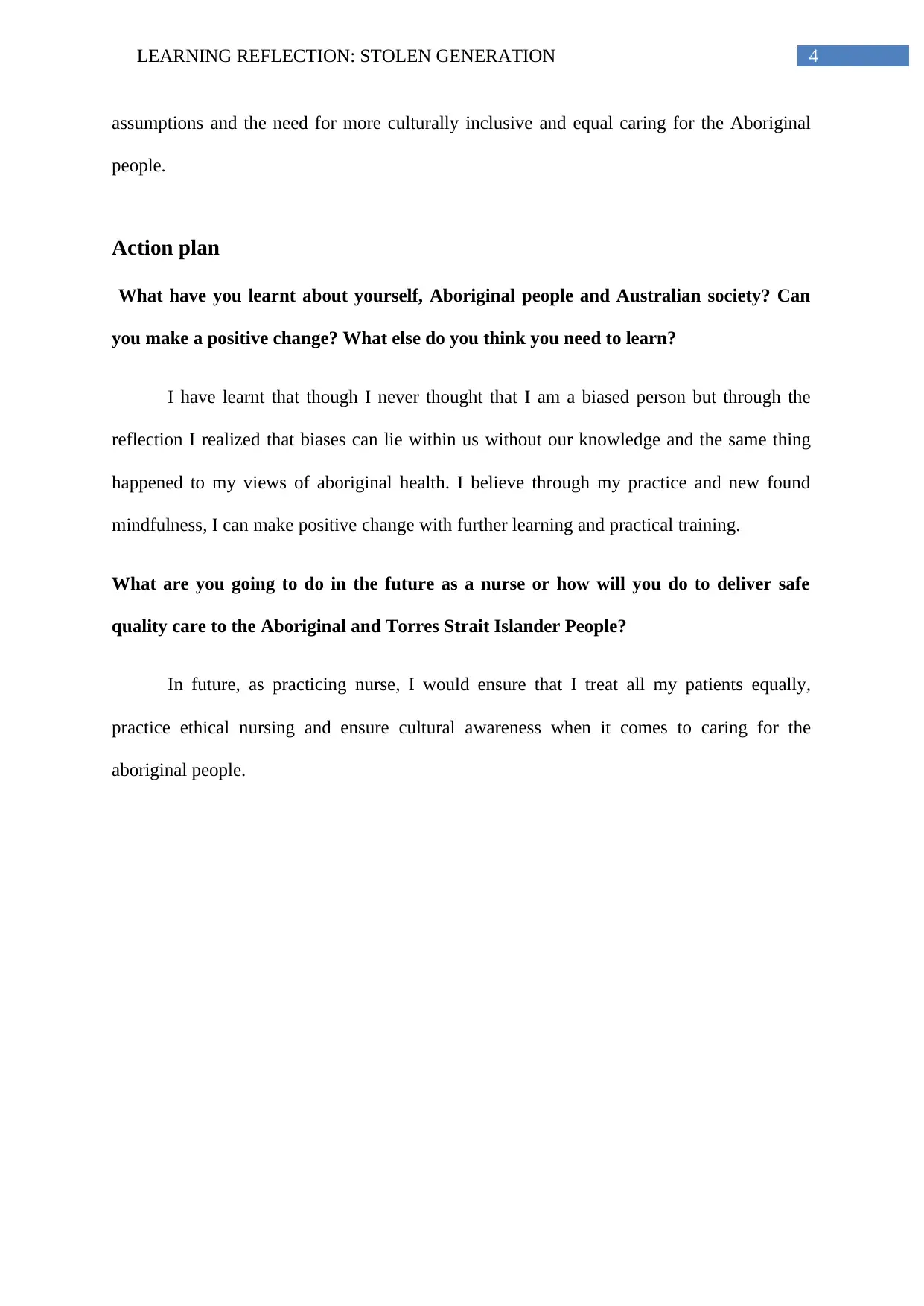
4LEARNING REFLECTION: STOLEN GENERATION
assumptions and the need for more culturally inclusive and equal caring for the Aboriginal
people.
Action plan
What have you learnt about yourself, Aboriginal people and Australian society? Can
you make a positive change? What else do you think you need to learn?
I have learnt that though I never thought that I am a biased person but through the
reflection I realized that biases can lie within us without our knowledge and the same thing
happened to my views of aboriginal health. I believe through my practice and new found
mindfulness, I can make positive change with further learning and practical training.
What are you going to do in the future as a nurse or how will you do to deliver safe
quality care to the Aboriginal and Torres Strait Islander People?
In future, as practicing nurse, I would ensure that I treat all my patients equally,
practice ethical nursing and ensure cultural awareness when it comes to caring for the
aboriginal people.
assumptions and the need for more culturally inclusive and equal caring for the Aboriginal
people.
Action plan
What have you learnt about yourself, Aboriginal people and Australian society? Can
you make a positive change? What else do you think you need to learn?
I have learnt that though I never thought that I am a biased person but through the
reflection I realized that biases can lie within us without our knowledge and the same thing
happened to my views of aboriginal health. I believe through my practice and new found
mindfulness, I can make positive change with further learning and practical training.
What are you going to do in the future as a nurse or how will you do to deliver safe
quality care to the Aboriginal and Torres Strait Islander People?
In future, as practicing nurse, I would ensure that I treat all my patients equally,
practice ethical nursing and ensure cultural awareness when it comes to caring for the
aboriginal people.
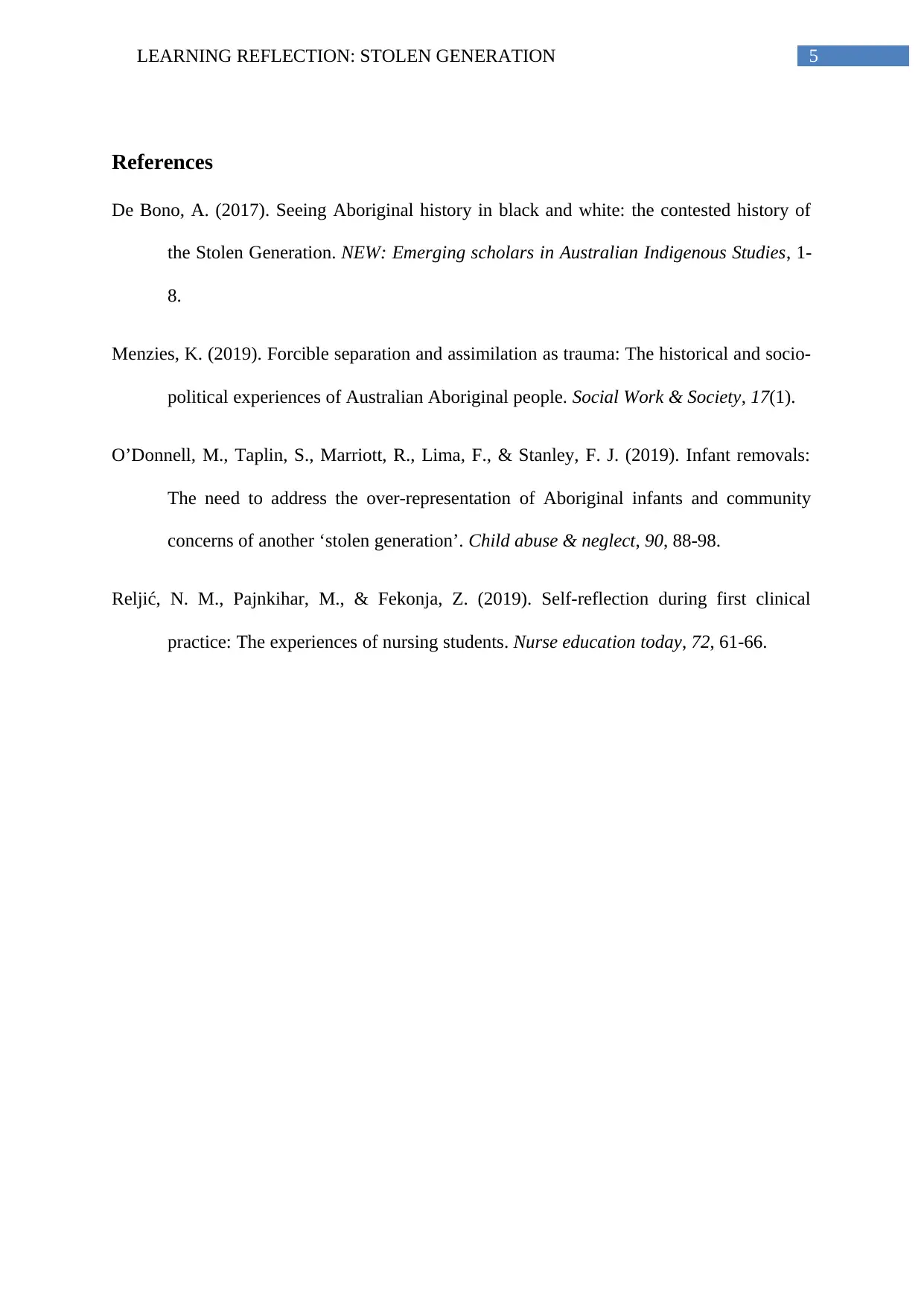
5LEARNING REFLECTION: STOLEN GENERATION
References
De Bono, A. (2017). Seeing Aboriginal history in black and white: the contested history of
the Stolen Generation. NEW: Emerging scholars in Australian Indigenous Studies, 1-
8.
Menzies, K. (2019). Forcible separation and assimilation as trauma: The historical and socio-
political experiences of Australian Aboriginal people. Social Work & Society, 17(1).
O’Donnell, M., Taplin, S., Marriott, R., Lima, F., & Stanley, F. J. (2019). Infant removals:
The need to address the over-representation of Aboriginal infants and community
concerns of another ‘stolen generation’. Child abuse & neglect, 90, 88-98.
Reljić, N. M., Pajnkihar, M., & Fekonja, Z. (2019). Self-reflection during first clinical
practice: The experiences of nursing students. Nurse education today, 72, 61-66.
References
De Bono, A. (2017). Seeing Aboriginal history in black and white: the contested history of
the Stolen Generation. NEW: Emerging scholars in Australian Indigenous Studies, 1-
8.
Menzies, K. (2019). Forcible separation and assimilation as trauma: The historical and socio-
political experiences of Australian Aboriginal people. Social Work & Society, 17(1).
O’Donnell, M., Taplin, S., Marriott, R., Lima, F., & Stanley, F. J. (2019). Infant removals:
The need to address the over-representation of Aboriginal infants and community
concerns of another ‘stolen generation’. Child abuse & neglect, 90, 88-98.
Reljić, N. M., Pajnkihar, M., & Fekonja, Z. (2019). Self-reflection during first clinical
practice: The experiences of nursing students. Nurse education today, 72, 61-66.
⊘ This is a preview!⊘
Do you want full access?
Subscribe today to unlock all pages.

Trusted by 1+ million students worldwide
1 out of 6
Related Documents
Your All-in-One AI-Powered Toolkit for Academic Success.
+13062052269
info@desklib.com
Available 24*7 on WhatsApp / Email
![[object Object]](/_next/static/media/star-bottom.7253800d.svg)
Unlock your academic potential
Copyright © 2020–2026 A2Z Services. All Rights Reserved. Developed and managed by ZUCOL.





